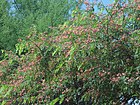Note: This is a project under development. The articles on this wiki are just being initiated and broadly incomplete. You can Help creating new pages.
Difference between revisions of "Cassia roxburghii - Red Cassia"
(→References) |
(→Identification) |
||
| Line 24: | Line 24: | ||
===Fruit=== | ===Fruit=== | ||
| − | {{Fruit|Typivcal legume|8-12 in (20.3-30.5 cm) long|Bears many seeds separated by papery partitions|With hooked hairs| | + | {{Fruit|Typivcal legume|8-12 in (20.3-30.5 cm) long|Bears many seeds separated by papery partitions|With hooked hairs|Many}} |
===Other features=== | ===Other features=== | ||
Revision as of 14:55, 10 April 2020
Red cassia is a graceful tree with spreading, drooping branches appearing to be overweighted. Typically the bark of the cassia tree is considered to be a substitute for cinnamon and it is known to produce a volatile oil that is very similar to cinnamon Oil.
Contents
Uses
Diabetes, Gastric problems, Muscle spasms, Nausea, Vomiting, Blotches, Infections, Diarrhea, Cold, Stomach spasms
Parts Used
Chemical Composition
Hexacosanol, 1‐octacosanol, palmitic acid, stearic acid, oleic acid, linoleic acid, heptacosyl [1]
Common names
| Language | Common name |
|---|---|
| Kannada | |
| Hindi | |
| Malayalam | |
| Tamil | |
| Telugu | |
| Marathi | NA |
| Gujarathi | NA |
| Punjabi | NA |
| Kashmiri | NA |
| Sanskrit | |
| English | Red Cassia, Ceylon Senna |
Habit
Identification
Leaf
| Kind | Shape | Feature |
|---|---|---|
| Simple | 1 ft (0.3 m) | Each has 15-20 pairs of oblong 2 in (5.1 cm) leaflets |
Flower
| Type | Size | Color and composition | Stamen | More information |
|---|---|---|---|---|
| Unisexual | 0.5 in (1.3 cm) long | Pink, rose or orange | 5 | Flowers Season is June - August |
Fruit
| Type | Size | Mass | Appearance | Seeds | More information |
|---|---|---|---|---|---|
| Typivcal legume | 8-12 in (20.3-30.5 cm) long | Bears many seeds separated by papery partitions | With hooked hairs | Many | {{{6}}} |
Other features
List of Ayurvedic medicine in which the herb is used
Where to get the saplings
Mode of Propagation
How to plant/cultivate
If you live in an area that meets the requirements of how hardy is a cassia tree, planting a cassia tree can be a striking addition to your landscape.[3]
Commonly seen growing in areas
Western ghats, Cultivated lands, Tropical area.
Photo Gallery
References
External Links
- Ayurvedic Herbs known to be helpful to treat Diabetes
- Ayurvedic Herbs known to be helpful to treat Gastric problems
- Ayurvedic Herbs known to be helpful to treat Muscle spasms
- Ayurvedic Herbs known to be helpful to treat Nausea
- Ayurvedic Herbs known to be helpful to treat Vomiting
- Ayurvedic Herbs known to be helpful to treat Blotches
- Ayurvedic Herbs known to be helpful to treat Infections
- Ayurvedic Herbs known to be helpful to treat Diarrhea
- Ayurvedic Herbs known to be helpful to treat Cold
- Ayurvedic Herbs known to be helpful to treat Stomach spasms
- Herbs with Leaves used in medicine
- Herbs with Bark used in medicine
- Herbs with common name in English
- Habit - Tree
- Index of Plants which can be propagated by Seeds
- Index of Plants which can be propagated by Cuttings
- Herbs that are commonly seen in the region of Western ghats
- Herbs that are commonly seen in the region of Cultivated lands
- Herbs that are commonly seen in the region of Tropical area
- Herbs
- Ayurvedic herbs that don't have seed photos
- Fabaceae









